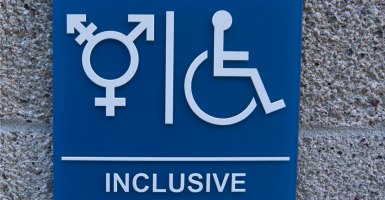Should transgender students attending public schools be allowed to use the bathroom aligned to their asserted gender?
That’s the question Nevada lawmakers are debating this week, as they consider a bill that would ban transgender students from using a bathroom, locker room or shower different from their biological sex.
The legislation, Assembly Bill 375, is popularly known as a “Bathroom Bill” because it specifically applies to transgender persons using sex-specific facilities. Various states have introduced similar versions of this legislation.
The American Psychological Association defines transgender as “persons whose gender identity, gender expression or behavior does not conform to that typically associated with the sex to which they were assigned at birth.”
Those in favor of the measure say the proposal is necessary to protect the physical privacy of students against the advances of the transgender movement in allowing people to use the restroom of their choice rather than the one that coordinates with their biological sex.
“That’s what these bills are designed to protect—the privacy of 99 plus percent of students who have very serious concerns about sharing bathrooms with kids of the opposite biological sex,” said Jeremy Tedesco, a senior legal counsel at Alliance Defending Freedom, a Christian legal organization that supports Nevada’s bill.
Tedesco says transgender advocates are “trying to undo” the way society has regulated the use of bathrooms, showers and locker rooms “for the course of our country’s history,” and maintains “the duty is on them to explain why we suddenly shouldn’t care what people’s biological sex is when it comes to a facility where people are going to be in a state of undress.”
Opponents call the policy “fundamentally discriminatory” and say Nevada lawmakers are addressing a problem that doesn’t exist.
Tod Story, executive director of the Nevada American Civil Liberties Union (ACLU), told The Daily Signal that he has “yet to see one example” of an individual taking advantage of such policies that would allow transgender individuals to use the bathroom of their choice.
“There certainly was no proof of a problem that exists,” he said in reference to a hearing on the legislation last Friday. “If you can’t provide any concrete proof that something is happening, why are you proposing a solution?”
Story, along with many of the bill’s challengers, say the measure is a form of “segregation” because it requires schools to provide “the best available accommodation” that meets the need of the transgender student—similar to the policy, “separate but equal.”
We’ve been through this kind of situation where segregation was a black mark on the history of the United States, it’s certainly not something that anyone was proud of, so at this point in time when we would segregate individuals according to the facilities they should use in places of public access is reminiscent of the laws that we have worked to eradicate.
Nevada’s legislation coincides with an apparent push by the Obama administration to advance lesbian, gay, bisexual and transgender rights by announcing its first-ever “gender-neutral” bathroom in the Eisenhower Executive Office Building to provide White House employees and visitors an “additional option.” The administration is also publicly condemning conversion therapy, which it defines as a practice “by mental health providers that seek to change an individual’s sexual orientation or gender identity.”
In Nevada’s case, to accommodate those who identify with a gender different from their biological sex, the bill requires public schools to “provide the best available accommodation” that meets the need of the student.
This can mean “access to a single-stall restroom, access to a unisex restroom or controlled use of a faculty restroom, locker room or shower.”
Tedesco of Alliance Defending Freedom believes the proposal is a “reasonable solution” to the riffs between transgender advocates and those concerned with the privacy of students.
“All the evidence that’s out there, transgender is something that affects the population at far less than one percent,” Tedesco said. “Schools have it within their authority, states have it within their public policy-making authority, to balance the competing interests and arrive at a reasonable resolution.”
But Story said the ACLU believes the measure is in violation of Title IX and VII, and pledged to “litigate it based on its violation of those two titles.”
Title VII prohibits discrimination on the basis of sex (among other characteristics) in the work place. Title IX requires schools that receive federal funds to provide gender equality for boys and girls, as commonly observed in the context of sports.
Tedesco says “plenty of courts” have looked at whether the claim of Titles IX or VII covers claims of discrimination on the basis of transgender status and “the near universal response is no, they don’t.”
In order to to apply either statute to gender or sex identity, Tedesco says Congress would have to make transgender people a protected class, which could trigger a national debate similar to that which occurred after Indiana decided to adopt a controversial religious freedom law.
“This could be the next [Religious Freedom Restoration Act],” he said.






























